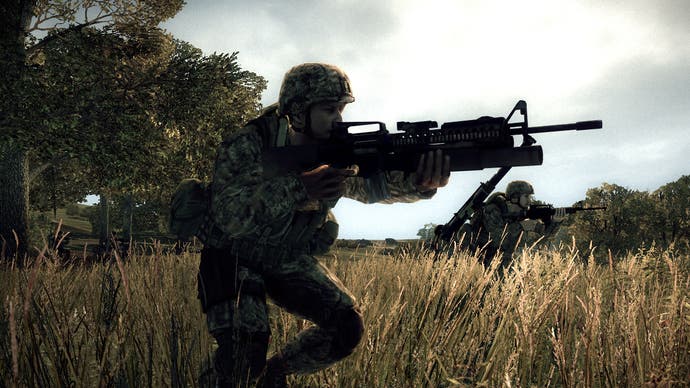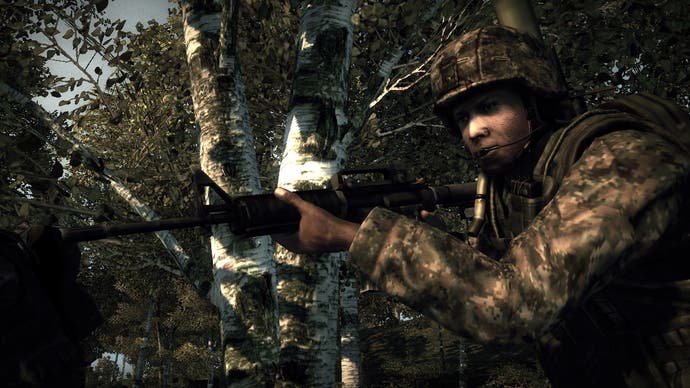Operation Flashpoint: Dragon Rising
Mao than meets the eye.
Lindop continues. "We very rapidly learned we could give PC players the quick-command system and allow the console players to use the complex command system, and they both work. One's for use when someone's trying to put a bullet in your face, and the other's for when you've got time to sit there and plan. Real soldiers in combat don't have time to fiddle with complex interfaces. You make decisions instantly because if you don't, you die."
"You almost get combos. For example, regroup is right, down, right," explains Lenton, demonstrating the simple directional inputs used to cycle through a surprising array of tactical options. No command, he assures us, will require more than three button-presses to find and implement. "You have these muscle-memory actions you can use. The idea behind this is that if you've got a conflict which is two or three hundred metres away, you want to be able to tell the guy with the heavy machine gun to lay down suppressing fire, tell this guy to move around that way, that guy to move around this way. You're coming down the middle and eventually you flank these guys."
When we finally get to sit down and see the latest PC build, the wisdom of this two-pronged control scheme becomes clear. The quick-command menu is great for reacting to the battlefield on the fly, the available options changing to reflect whatever you're looking at. For the moments when you have the luxury of more time to plan ahead, such as the start of a mission, you can call up the map screen, set waypoints and order your squad in a much more strategic manner, all in real time.

Your squad is remarkably self-sufficient, thanks to a high-level AI model which, the team insists, is able to take the most basic orders and interpret them in a naturalistic and efficient manner. Dragon Rising's gameworld is a dynamic, fluid place where every soldier, both allied and enemy, is governed by a complex "playbook" of tactical options for every eventuality. All drawn from actual military training manuals, it means the player isn't the odd one out in the field when it comes to appraising the situation.
"Now the AI is a lot smarter, they're constantly telling you things," Lindop explains. "What they can see, how they're feeling." This constant feedback from your allies is used to minimise the amount of game clutter, and to compensate for the general lack of HUD distractions. "One of the things I'm especially proud of is that they use very fluid real-world tactics, and do it of their own volition. They'll reassess which tactics they're using on a moment by moment basis, so they don't commit wholly to an attack. They can change at any moment."

One of the group playing discovers the implications of this all too clearly, as his bold plan to drive erratically at the enemy, shooting wildly, doesn't go down very well with his AI team. "F**k this s**t!" shouts one, before retreating and leaving our hapless player to deal with the aftermath of his rash actions alone. Lindop reckons that far from making the game harder, this level of self-sufficiency will actually make it easier for novices to get their heads around the harsh realities of war. "It's not a steep learning curve. The guys with you know what they're doing, so you don't have to micro-manage them. You've actually got space to figure things out for yourself."


.png?width=291&height=164&fit=crop&quality=80&format=jpg&auto=webp)




.jpg?width=291&height=164&fit=crop&quality=80&format=jpg&auto=webp)
